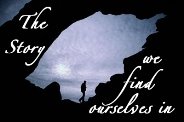Transformation Begins with Honesty
The Psalms help us be real! In Honesty That Heals, a sermon preached on January 15, 2006, we look at Psalm 77 as a model of that journey from rage to reflection to rejoicing that is part of praying the Psalms (and other scriptures of course.) Those who appreciate Kathleen Norris' Cloister Walk, will enjoy the additional quotes below that were not included in the sermon.
I also quote Eugene Peterson. His book Answering God is all about the extensive use of the Psalms in spiritual formation; an incredible book on understanding both prayer and the Psalms.
Kathleen Norris from Cloister Walk:
You come to the Bible’s great “book of praises” through all the moods and conditions of life, and while you may feel like the pits, you sing anyway. To your surprise, you find that the Psalms do not deny your true feelings but allow you to reflect on them, right in front of God and everyone.
The world the Psalms depict is not that different from our own; the 4th century monk Athanasius wrote that the Psalms “become like a mirror to the person singing them,” and this is true now too.
They remind us that the mundane and the holy are linked.
The Psalms make us uncomfortable because they don’t let us deny - either the depth of our pain or the possibility of its transformation into praise.
We commit ourselves to being changed by the Psalms, allowing the words to work on us, and sometimes to work us over.
The Psalms are unrelenting in their realism. They ask us to consider our true situation and to pray over it. They ask us to be honest about ourselves. (p. 104)
From Norris' Quotidian Mysteries:
(Early woman monastic Syncletica) “There is a grief that is useful, and there is a grief that is destructive. The first sort consists in weeping over one’s faults and weeping over the weakness of you neighbor…..but there is also a grief that comes from the enemy, full of mockery, which some call acedia (spiritual depression/ listlessness; not bearing the thought of going on). This spirit must be cast out, mainly by prayer and psalmody (praying the Psalms as a spiritual exercise)
More from Cloister Walk:
People who rub up against the psalms every day come to see that, while children may praise spontaneously, it can take a lifetime for adults to recover this ability. One sister told me that when she first entered the convent as an idealistic young woman, she had tried to pretend that "praise was enough." It did not last long. The earthy honesty of the psalms had helped her, she says, to "get real, get past the holy talk and the romantic image of the nun." In expressing all the complexities and contradictions of human experience, the psalms act as good psychologists. They defeat our tendency to try to be holy without being human first. Psalm 6 mirrors the way in which our grief and anger are inextricably mixed; the lament that "I am exhausted with my groaning; / every night I drench my pillow with tears" (v. 6) soon leads to rage: "I have grown old surrounded by my foes. / Leave me, you who do evil" (vv. 7-8). Psalm 38 stands on the precipice of depression, as wave after wave of bitter self-accusation crashes against the small voice of hope. The psalm is clinically accurate in its portrayal of extreme melancholia: "the very light has gone from my eyes" (v. 10), "my pain is always before me" (v. 17), and its praise is found only in the possibility of hope: "It is for you, O Lord, that I wait" (v. 15). Psalm 88 is one of the few that ends without even this much praise. It takes us to the heart of pain and leaves us there, saying, "My one companion is darkness" (v. 18). We can only hope that this darkness is a friend, one who provides a place in which our deepest wounds can heal.
The psalms make us uncomfortable because they don't allow us to deny either the depth of our pain or the possibility of its transformation into praise. As a Benedictine sister in her fifties, having recently come from both the loss of a job and the disintegration of a long-term friendship, put it to me, "I feel as if God is rebuilding me, 'binding up my wounds' " [Ps. 147:3]. "But," she adds, "I'm tired, and little pieces of the psalms are all I can handle. Once you've fallen apart, you take what nourishment you can. The psalms feel like a gentle spring rain: you hardly know that it's sinking in, but something good happens."
The psalms reveal our most difficult conflicts and our deep desire to run from the shadow. In them, the shadow speaks to us directly, in words that are painful to hear. In recent years, some Benedictine houses, particularly women's communities, have begun censoring the harshest of the psalms, often called the "cursing psalms," from their public worship. But one sister, a liturgist, said after visiting such a community, "I began to get antsy, feeling, something is not right. The human experience is of violence, and the psalms reflect our experience of the world."
The psalms are full of shadows--enemies, stark images of betrayal: "Even my friend, in whom I trusted, / who ate my bread, has turned against me" (Ps. 41:9). Psalm 10 contains an image of a lion who "lurks in hiding" (10:9) that calls to my mind the sort of manipulative people whose true colors come out only behind the doors of their "lairs." Psalm 5 pictures flatterers, "their throat a wide-open grave, all honey their speech" (v. 9). As C. S. Lewis has noted in Reflections on the Psalms, when the psalms speak to us of lying and deceit, "no historical readjustment is required. We are in the world we know."

0 Comments:
Post a Comment
<< Home